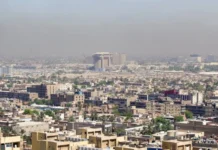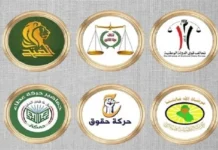Tishwash: The President of the Republic heads the participants.. Davos Forum Investment Dialogue and Confidence Building
The World Economic Forum in the Swiss resort of Davos, today, Monday, brings together major global leaders in the fields of economy, technology, politics and society, under the slogan “Cooperation for the Smart Age ”, and continues until January 24, to discuss current economic, technological and environmental issues and ways to find solutions for them.
3,000 prominent figures from more than 130 countries are participating, including many heads of state and government, including the President of the Republic of Iraq, Abdul Latif Jamal Rashid.
There will be strong representation from around the world, across sectors and geographies, to drive dialogue, build trust and catalyze sustainable solutions to common challenges.
The forum will witness the participation of more than 1,600 business leaders, including more than 900 senior CEOs and chairmen of the boards of directors of member companies and partners of the forum, in addition to more than 120 global innovators, technology pioneers and start-ups.
The Davos Forum focuses on five main areas: reimagining growth, industries in the smart age, investing in people, protecting the planet, and rebuilding trust. link
************
Tishwash: Prime Minister’s Advisor: Electronic customs declaration prevents smuggling and limits corruption and bribery
The Prime Minister’s Advisor for Financial Affairs, Mazhar Mohammed Saleh, confirmed today, Sunday, that the electronic customs declaration program prevents smuggling and limits corruption and bribery. While he explained that it facilitates accurate and rapid oversight and review, he pointed out that it reduces costs for importers.
Saleh said in an interview with the Iraqi News Agency, followed by “Al-Eqtisad News”, that “the program for developing the electronic customs declaration and its entry into force is an important and positive step towards improving customs performance in particular and enhancing the efficiency of the Iraqi economy in general.”
He added that “the adoption of this electronic program for customs declaration represents an important part of the reform efforts branching out from the government program in the field of e-governance and financial and economic reform, which aims to modernize administrative and financial systems, combat corruption, and raise the efficiency of Iraq’s foreign trade,”
Noting that “this electronic system provides two important details in customs life in the development of customs policy applications in Iraq, as it is one of the important arms of financial policy in our country, which are: First, reducing human intervention in customs clearance operations, which reduces the opportunities for corruption and bribery.”
He continued: “The second provides clear tracking of transactions, which facilitates effective, accurate and rapid customs control and review,” indicating that “the electronic customs declaration program will undoubtedly reduce the time required to complete customs declarations, in a way that supports the movement of trade and reduces the costs that fall on traders and importers. This change in the pattern of customs declarations encourages companies to import and export goods with ease and high speed.”
He explained, “As for customs revenues, the program will contribute to providing accuracy in collecting customs duties in a way that prevents customs evasion, as taxes are a form of important public revenues that the government program seeks to raise within non-oil revenues, in addition to reducing losses resulting from corruption or negligence in collecting related customs duties and taxes, as was previously followed, using manual methods and human intervention.”
He pointed out that “the business environment in the national economy gives an advanced signal to investors and traders, and its precise operations should be positively reflected in the reports of multilateral international organizations within the framework of the progress of the business environment in our country, including the World Bank’s periodic reports in this regard link
************
Tishwash: Al-Nusairi: Banks are the lever of sustainable development
Economic and banking advisor Samir Al-Nusairi confirmed, on Sunday, the completion of the Central Bank’s procedures for implementing the goals and initiatives of its third strategy 2024-2026, which is concerned with developing and restructuring the banking sector in accordance with what the consulting and auditing companies that are currently cooperating with the Central Bank and with the government in this field have reached, and that it should not be limited to support, but rather go beyond that to include the banking sector in making economic, financial, banking and investment decisions.
Al-Nusairi spoke about the challenges of the Iraqi economy and the opportunities for reform of the banking sector in the government’s program and the prospects of the Central Bank’s future vision for the role of the banking sector in sustainable development.
In light of the efforts currently being made to activate and revolutionize the productive economic sectors other than oil to diversify sources of national income and achieve financial sustainability, and the role of the Central Bank in regulating foreign trade financing and completing infrastructure projects to achieve comprehensive digital transformation and expand the use of electronic payment tools in achieving financial inclusion.
He explained that the opportunities for reforming and developing the banking sector in 2025 are as follows:
1- Developing the Iraqi banking system and its compliance with international banking and accounting standards.
2- Enhancing citizens’ confidence in the banking sector locally and internationally recognizing its transparency, progress, and strict commitment to international standards and obtaining the confidence of solid correspondent banks to deal with it.
3- Converting banks to their primary function, which is financing and bank lending for development.
4- Banks that do not provide loans and banking facilities that help in development as a lever for sustainable development lose their meaning as banks, which requires a specific position towards them from the Central Bank in 2025.
5- Seeking to move from a cash economy to a digital economy and withdrawing money outside the banking cycle and introducing it into the banking system.
He pointed out that all the above goals, although the period specified for their implementation according to the timetable of the government program and the strategy of the Central Bank ranges between (1-4 years), what was achieved in 2023 and 2024 constitutes about 60% as announced, which led to the evaluation and classification of banks based on their achievement of the planned goals. There are banks that are moving towards the required development and banks that still need an additional period of time to achieve the goals, and there are troubled banks that are now making exceptional efforts from the Central Bank and the administrations of these banks to rehabilitate them.
He added that what concerns us here is the real functional role of banks in providing loans and banking facilities and moving from a banking role to a developmental role. There are two important observations that must be taken into consideration regarding the issue of providing loans and banking facilities to stimulate the economy and development. The first: The nature of banks’ activities depends on the nature of the activities of the economic sectors, and as long as economic activity is focused on trade (imports), banks’ activity remains focused on external transfers and what is related to that, so unless other sectors move (industry, agriculture, tourism, etc.).
It is worth noting that without controlling imports, these sectors will not develop. Second: It is necessary to provide the legal environment and extend the authority of the law in order to control the speculation market in the US dollar on the black market and to eliminate the phenomenon of illegal trade through unofficial outlets. link





